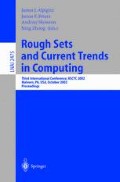Abstract
The rough set approach is a mathematical tool for dealing with imprecision, uncertainty, and vagueness in data. Guarded command languages provide logical approaches for representing constrained nondeterminacy in an otherwise deterministic system without incorporating probabilistic elements. Although from dramatically different functional and mathematical origins, both approaches attempt to resolve observed or anticipated discontinuities between specific pre- and post-condition states of a given information system. This paper investigates the use of a guarded command language in the generation of rough data from explicit decision rules, and in the extraction of implicit decision rules from rough experimental data. Based on these findings, rough sets and guarded command languages appear to be compatible and complementary in their approaches to imprecision and uncertainty. As the association between rough sets and guarded command language represents a new and heretofore untested research direction, possible research alternatives are suggested.
Access this chapter
Tax calculation will be finalised at checkout
Purchases are for personal use only
Preview
Unable to display preview. Download preview PDF.
References
Pawlak Z.: Rough Sets. International Journal of Computer and Information Science. Vol. 11 (1982) 341–356
Pawlak, Z.: Rough Sets: Theoretical Aspects of Reasoning About Data. Kluwer Academic Publishers, Boston, MA (1991)
Peters, J.F., Skowron, A., Suraj, Z., Pedrycz, W., Ramanna, S.: Approximate Real-Time Decision-Making: Concepts and Rough Fuzzy Petri Net Models. International Journal of Intelligent Systems 14/8 (1999) 805–839
Dijkstra, E.W.: Guarded Commands, Nondeterminacy and the Formal Derivation of Programs. Communications of the ACM, Vol. 18 (1975) 453–457
Dijkstra, E.W.: A Discipline of Programming. Prentice Hall International, Engle-woood Clifts, NJ (1976)
He, J., Seidel, K., McIver, A.: Probabilistic Models for the Guarded Command Language. Science of Computer Programming, Vol. 28 (1997) 171–192
Morgan, C., McIver, A.: pGCL: Formal Reasoning for Random Algorithms. South African Computer Journal, Vol. 22 (1999) 14–27
Pawlak Z., Grzymala-Busse J., Slowinski R., Ziarko, W.: Rough Sets. Communications of the ACM, Vol. 38 (1995) 88–95
Author information
Authors and Affiliations
Editor information
Editors and Affiliations
Rights and permissions
Copyright information
© 2002 Springer-Verlag Berlin Heidelberg
About this paper
Cite this paper
Ramsey, F.V., Alpigini, J.J. (2002). Rough Sets, Guarded Command Language, and Decision Rules. In: Alpigini, J.J., Peters, J.F., Skowron, A., Zhong, N. (eds) Rough Sets and Current Trends in Computing. RSCTC 2002. Lecture Notes in Computer Science(), vol 2475. Springer, Berlin, Heidelberg. https://doi.org/10.1007/3-540-45813-1_23
Download citation
DOI: https://doi.org/10.1007/3-540-45813-1_23
Published:
Publisher Name: Springer, Berlin, Heidelberg
Print ISBN: 978-3-540-44274-5
Online ISBN: 978-3-540-45813-5
eBook Packages: Springer Book Archive

